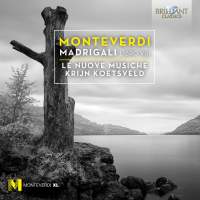Texte paru dans: / Appeared in: |
|
|
Outil de traduction ~ (Très approximatif) |
|
|
Reviewer: James
V. Maiello
Like the other discs in Krijn
Koetsveld’s cycle of Monteverdi’s complete madrigals, this recording offers
competent, consistent readings of the composer’s Eighth Book of Madrigals;
the next volume of the set—Books I and II—is slated for release in late May
2017.
Il Combattimento di Tancredi e
Clorinda is
representative of Koetsveld’s approach. The harmonic outline of the continuo
is restrained and precise, the tutti playing of the strings articulated
clearly. Both instrumental and concerted textures are so transparent one
could take dictation to the recording. In a luminous performance as the
narrator, Falco van Loon is focused and crystalline; Wendy Roobol is a
clean, nimble Clorinda. Arnout Lems is the most dramatic of the soloists,
voicing Tancredi in a rich but gentle baritone. Unfortunately, the
performance is missing much of the dramatic intensity inherent in
Monteverdi’s writing. This is most apparent at cadences and other
dissonances, but also in some of the text’s most expressive, dramatic
moments. Although this is a wonderfully clear performance, one might
consider something like Le Concert Astrée’s recording under Emmanuelle Haïm
(featuring Rolando Villazón) for a more fiery alternative. The other touchstone of Monteverdi’s Eighth Book of Madrigals is the Lamento della ninfa. Although some of her high notes are a bit strained and slightly under pitch, Roobol is an appropriately doleful nymph, augmented by van Loon and Bas Ramselaar (bass) to create a three-part choral sound that is pure and well balanced. Koetsveld’s spare approach is particularly effective here, allowing Monteverdi’s part-writing to shine and preventing the continuo from disappearing into the choral texture. Like Combattimento, the continuo is solid, but unobtrusive; the theorbo provides textural interest. Not as universally known, the Ballo delle ingrate is one of the other major works in the collection. Here, Roobol (Venus) and Ramselaar (Pluto) are featured again, with Jennifer van der Hart rounding out the cast as Love. Punctuated by sinfonias and ballets, the celebratory work was written for the wedding of Francesco Gonzaga and Margaret of Savoy. The orchestra might reflect a touch more of the festive spirit, but the ensemble playing is tightly controlled, each part rendered meticulously. Likewise, the singing is direct and clear, but the vocal parts might benefit from a freer approach, rhythmically and expressively. To undertake a complete recording of Monteverdi’s madrigals is an ambitious endeavor; to accomplish this with consistency and polish is an altogether more daunting task. Koetsveld and Le Nuove Musiche are to be commended on their progress in doing this so far. These are faithful, accurate recordings, though on the conservative side interpretively. This is neither the most dramatic nor idiosyncratic recording of Monteverdi’s Eighth Book of Madrigals. It is—ironically—these aspects, however, that make it a solid, eminently valuable reference recording, coupled as they are with decidedly expert performances. | |
|
Support us financially by purchasing this disc from eiher one of these suppliers. Un achat via l'un ou l'autre des fournisseurs proposés contribue à défrayer les coûts d'exploitation de ce site. |
|
|
|
|
|
Cliquez l'un ou l'autre
bouton pour découvrir bien d'autres critiques de CD |
|




